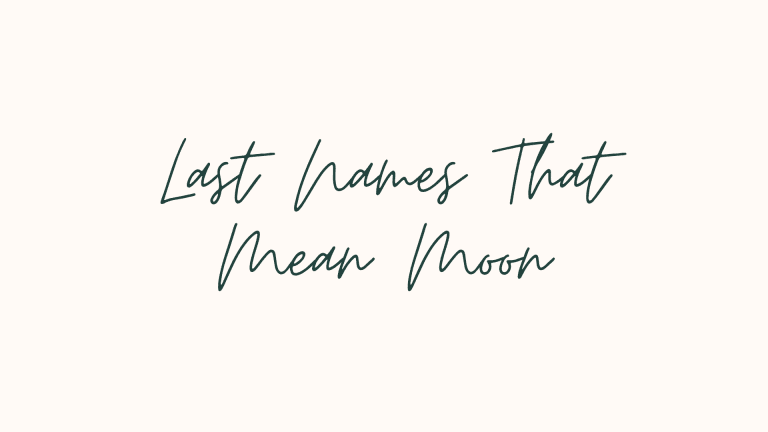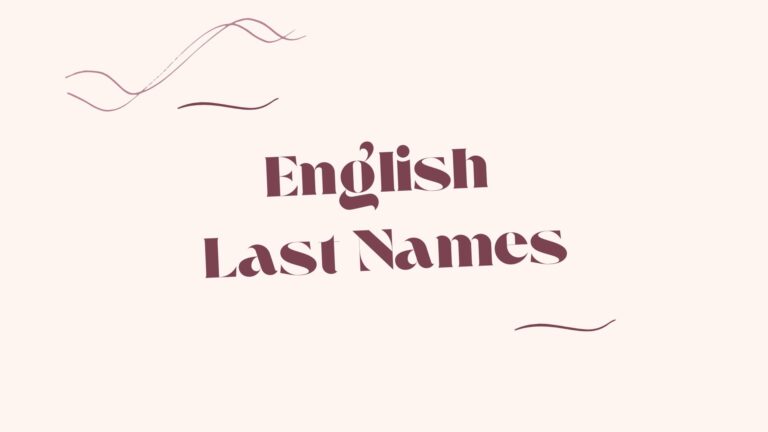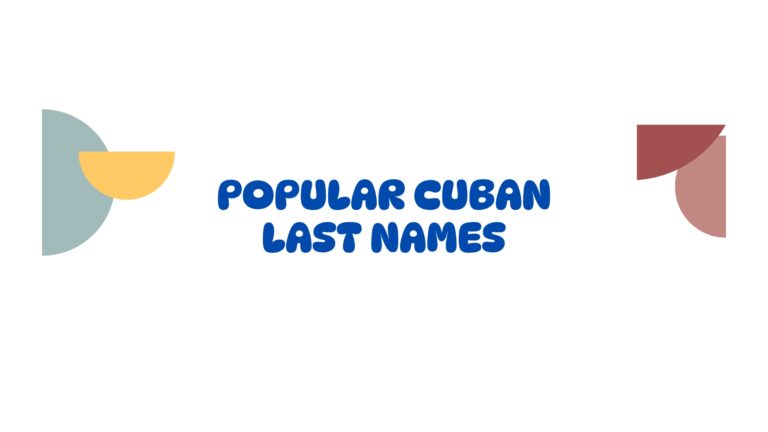100 Cool Canadian Last Names
Canadian surname heritage is as diverse as the country’s history: Indigenous, French, British, and other European influences.
The compiled surnames will tell a story from yesteryears about the former and contemporary Canadian emergence.
This post looks through the etymologies and meanings of common and unique Canadian surnames, which declare Canada’s multicultural identity.
Whether your name is connected to a specific province or rooted in the nation’s early settler history, join us as we delve into the fascinating world of Canadian family names.
Canadian last names
Dupont (French) – “From the bridge” or “of the bridge.”
Lafleur (French) – “The flower.”
Benoit (French) – Derived from the Latin “Benedictus,” meaning “blessed.”
MacDonald (Scottish) – “Son of Donald,” with Donald meaning “ruler of the world.”
Johnson (English) – “Son of John,” meaning “God is gracious.”
Gagnon (French) – Derived from the Old French word for “prosperous” or “rich.”
Leblanc (French) – “The white,” often referring to fair skin or hair.
Roy (French) – “King” or “royalty,” often a nickname or title.
Tremblay (French) – “The trembling,” likely referring to trees shaking in the wind.
Martel (French) – “The hammer,” likely referring to someone with a strong, forceful personality.
Fortin (French) – “Little fort,” referring to someone living near a fort or stronghold.
Thibault (French) – Derived from the Germanic name “Theobald,” meaning “brave people.”
Lemoine (French) – “The monk,” often referring to a religious figure.
Charbonneau (French) – “The charcoal maker.”
Bouchard (French) – Derived from the Old French “bouchier,” meaning “butcher.”
Côté (French) – “The side,” often referring to a person living on the edge of a settlement.
Pelletier (French) – “The furrier,” someone who dealt in furs or pelts.
Charron (French) – “Cartwright,” or a person who makes or repairs carts.
Brunet (French) – “Brown,” referring to dark hair or complexion.
Dufresne (French) – “The ash tree,” likely referring to a place near these trees.
Perron (French) – Derived from the word “perron,” meaning “a stone or block of stone,” often a place name.
Boisvert (French) – “Greenwood” or “green forest.”
Savard (French) – “Wild,” potentially referring to untamed land or character.
Beaulieu (French) – “Beautiful place.”
Godbout (French) – Derived from the old French term for “God’s gift.”
Lavigne (French) – “The vineyard,” referring to someone who worked with or lived near a vineyard.
Bourgeois (French) – “The middle class” or “townsman.”
Rousseau (French) – “The red-haired” or “redhead.”
Desjardins (French) – “Of the gardens.”
Simard (French) – A surname derived from the old French “sieur” meaning “lord” or “master.”
Tanguay (French) – Derived from an old French term, possibly meaning “fighter.”
Vachon (French) – “Cowherd” or “one who herds cattle.”
Lachance (French) – “The luck” or “fortune.”
Vinet (French) – A variant of “vine,” referring to someone who grew or sold grapes.
Arsenault (French) – Possibly derived from the Old French “arsenal,” meaning “workshop” or “place of weapons.”
Fournier (French) – “The baker” or “the one who works with grain.”
Chabot (French) – “The small river” or “stream.”
Dagenais (French) – Likely derived from a place name or a family estate.
Brisebois (French) – “Woodcutter” or “breaks wood.”
Bourgault (French) – Derived from “bourg,” meaning a village or town.
Mercier (French) – “Merchant” or “trader.”
Caron (French) – Derived from the Old French word for “chariot” or “wagon.”
Lemoine (French) – “The monk,” referring to a religious figure.
Ouellet (French) – Derived from a place name or personal characteristic, meaning “little well.”
Lavoie (French) – “The way” or “path.”
Caron (French) – A surname of uncertain origin, possibly from a word meaning “cart.”
Bazin (French) – Likely derived from a place name or occupation, referring to a worker with metals.
Nadeau (French) – Derived from “nadir,” meaning “below” or “down.”
Picard (French) – A surname originating from the Picardy region of France, referring to someone from that area.
Vaillancourt (French) – “Strong heart” or “brave,” from Old French origins.
St-Pierre (French) – “Saint Peter,” referring to the apostle.
Girard (French) – Derived from the Germanic “Gerhard,” meaning “brave spear.”
Poulin (French) – Likely derived from “poul,” meaning “fowl” or “chicken.”
Vermette (French) – “Vermilion,” referring to a red color or a place named after it.
Blais (French) – A variation of the name “Blaze,” meaning “a flame.”
Leduc (French) – Derived from the Old French word for “the leader.”
Fournier (French) – “Baker,” someone who worked with grain or baked bread.
Lemoine (French) – “The monk,” possibly referring to someone who lived near a monastery.
Gauthier (French) – Derived from the Germanic name “Waldhar,” meaning “ruler of the forest.”
Lambert (French) – Derived from the Germanic name “Lambrecht,” meaning “land bright.”
Jolin (French) – Likely derived from “Jolien,” meaning “pretty” or “handsome.”
Duchesne (French) – “Of the oak,” referring to someone who lived near oak trees.
Beaupré (French) – “Beautiful meadow” or “beautiful field.”
Bouchard (French) – Derived from “boucher,” meaning “butcher.”
Dubeau (French) – “The beautiful,” possibly referring to someone with a pleasing appearance or living in a beautiful place.
Fiset (French) – Derived from “fisher” or “fisherman.”
Gosselin (French) – Derived from the Old French personal name “Gozelin,” meaning “God’s protection.”
Dufresne (French) – “The ash tree,” a reference to the tree or a place near ash trees.
Cloutier (French) – “Shoemaker” or someone who made shoes.
Piché (French) – Likely a variant of “Pichon,” meaning “small” or “little.”
Thibeault (French) – A variant of “Thibault,” meaning “brave people.”
Landry (French) – Derived from the Germanic name “Landric,” meaning “ruler of the land.”
Prévost (French) – Derived from “prévôt,” meaning “provost,” a title for a high-ranking official.
Guilbault (French) – Possibly derived from “Gilbert,” meaning “bright pledge.”
Bélanger (French) – “The good angel” or “the angelic one.”
Caron (French) – Possibly referring to someone who worked with carts or wagons.
Vermette (French) – Referring to the color vermilion, a bright red.
Gagné (French) – Derived from “gagner,” meaning “to win” or “to gain.”
Lacoste (French) – Likely referring to someone who lived near a “côte” (a hill or slope).
Lemoine (French) – “The monk” or “religious person.”
Dufault (French) – “The fault” or “wrong,” potentially referring to a difficult situation or place.
Marchand (French) – “Merchant” or “trader.”
Charest (French) – Derived from “chare,” meaning “cart” or “wagon,” referring to someone who worked with carts.
Cousineau (French) – Likely derived from “cousin” or “relative.”
Tremblay (French) – Derived from “trembler,” meaning “to tremble,” likely referring to the trembling of trees in the wind.
Boivin (French) – Derived from “bois,” meaning “wood” or “forest.”
Gouin (French) – Derived from “gouine,” meaning “to climb” or “climber.”
Thivierge (French) – Likely derived from “vierge,” meaning “virgin,” referring to someone pure or untouched.
Lapointe (French) – “The point,” referring to a geographic location.
Jodoin (French) – Derived from “Jodoine,” a variation of “Jordan,” meaning “flowing down.”
Laframboise (French) – “The raspberry,” referring to the berry or the person who grew them.
Poirier (French) – “The pear tree.”
Langlois (French) – “The long woods” or “long forest.”
Beauregard (French) – “Beautiful view” or “beautiful outlook.”
Giroux (French) – Likely a variation of “Girard,” meaning “brave spear.”
Delisle (French) – Likely referring to an island or someone who lived near one.
Boucher (French) – “Butcher,” someone who sold or worked with meat.
Nault (French) – Likely a variation of “Noll,” meaning “noble” or “famous.”
Tanguay (French) – Derived from the Old French word meaning “fighter” or “warrior.”
Pelland (French) – Likely derived from “pel,” meaning “skin” or “hide,” referring to someone who worked with animal hides.







